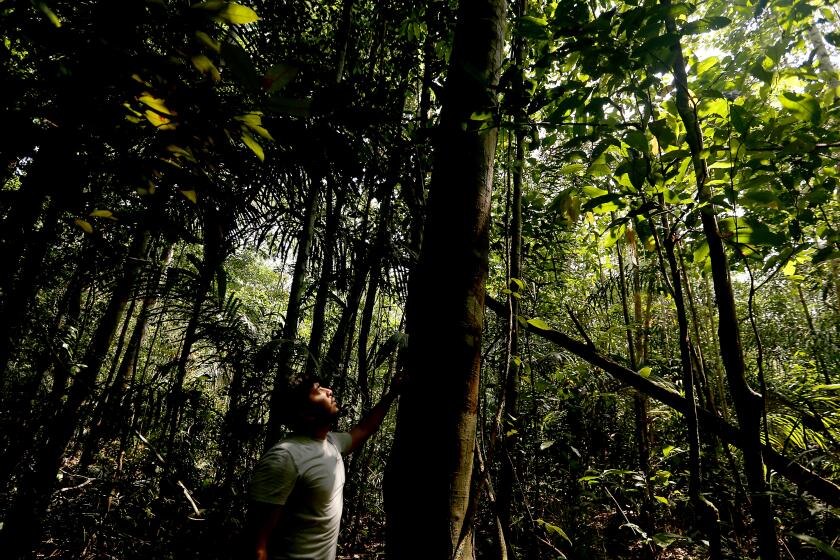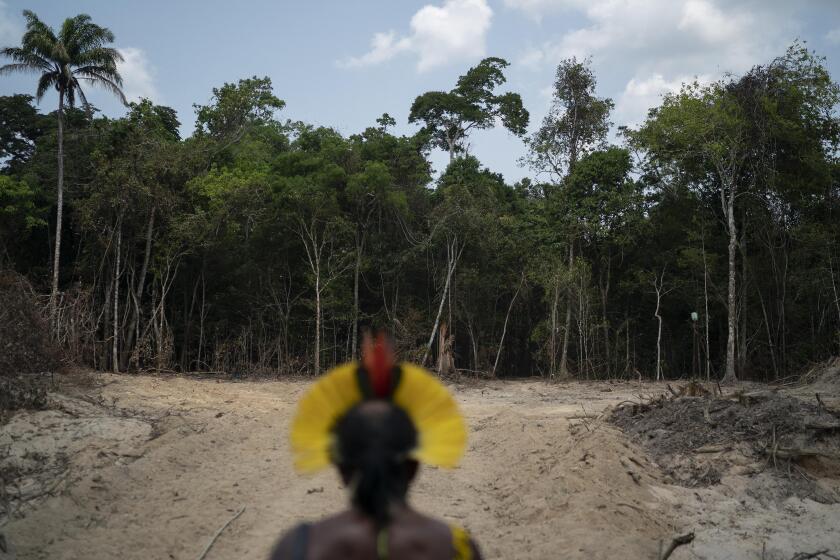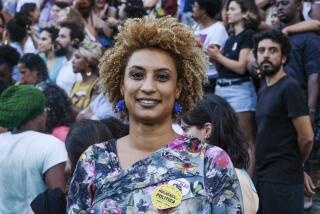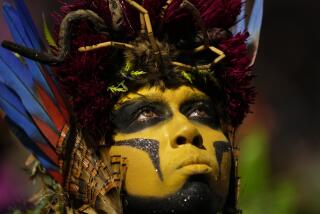Brazil police find human remains in search for 2 missing in the Amazon
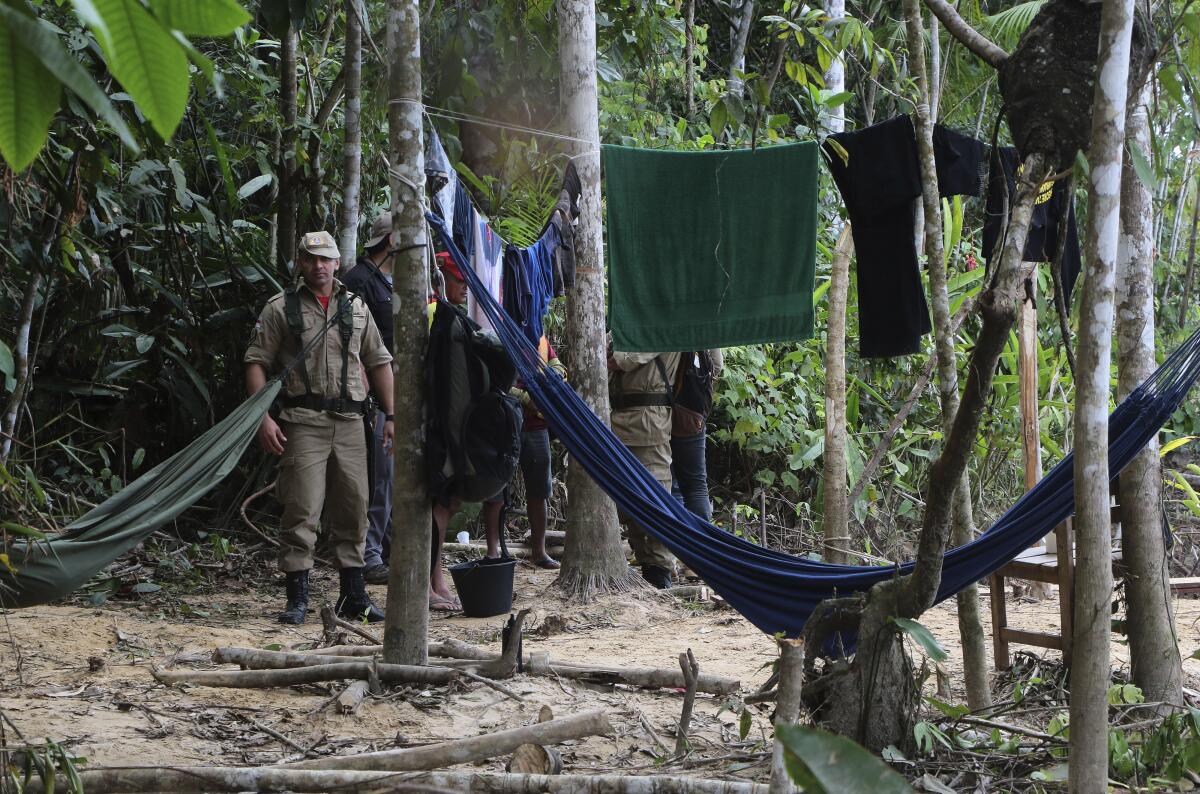
- Share via
ATALAIA DO NORTE, Brazil — Brazil’s justice minister said Wednesday that police reported finding human remains in the Amazon area where an Indigenous expert and a British journalist disappeared more than a week ago.
Justice Minister Anderson Torres said the remains had not been identified.
Writing on Twitter, he said: “I have just been informed by the federal police that ‘human remains have been found at the place where digging was being made.’ Those will be submitted to forensics.”
No further details were immediately available.
The federal police said in a statement earlier, after a suspect was taken to the search area, that it would hold a news conference Wednesday evening to make “an exceptional clarification about the investigations.”
Colleagues of the missing Indigenous expert, Bruno Pereira, called a vigil outside the headquarters of the Brazilian government’s Indigenous affairs agency in Brasilia.
Pereira was on leave from the agency when he disappeared June 5 while traveling with Dom Phillips, a British freelance journalist.
At the edge of the Amazon rainforest...
They were last seen on their boat in a river near the entrance of the Javari Valley Indigenous Territory, which borders Peru and Colombia. That area has seen violent conflicts involving fishermen, poachers and government agents.
The justice minister’s announcement came a few hours after police took a suspect out on the river toward search parties looking for Phillips, 57, and Pereira, 41.
An Associated Press photographer in Atalaia do Norte, the city close to the search zone, witnessed police taking the suspect, who was in a hood, on a boat.
On Tuesday, police said they had arrested a second suspect in connection with the disappearance. He was identified as Oseney da Costa de Oliveira, 41, a fisherman and a brother of the man characterized by police as the main suspect in the case, Amarildo da Costa de Oliveira, also 41, nicknamed Pelado.
The second suspect told AP on Friday that he had visited Pelado in jail and was told that local police had tortured him in attempts to get a confession. Oseney da Costa de Oliveira said his brother was innocent.
The record deforestation figure for April reflects a worrisome uptick in destruction in a state deep within Brazil’s rainforest.
Both men were being held at the jail in Atalaia do Norte, but because of the hood, it was unclear who was being led by police.
Indigenous people who were with Pereira and Phillips have said that Pelado brandished a rifle at them on the day before the two men disappeared.
He has denied any wrongdoing and claims police tortured him to try to get a confession, his family told the Associated Press.
Official search teams had concentrated their efforts around a spot in the Itaquai river where a tarp from the boat used by the missing men was found Saturday by volunteers from the Matis Indigenous group.
“We used a little canoe to go to the shallow water. Then we found a tarp, shorts and a spoon,” one of the volunteers, Binin Beshu Matis, told AP.
Authorities began scouring the area and discovered a backpack, laptop and other personal belongings submerged Sunday. Police said that evening that they had identified the items as belonging to both missing men, including a health card and clothes of Pereira. The backpack was determined to belong to Phillips.
Police previously reported finding traces of blood in Pelado’s boat. Officers also found organic matter of apparent human origin in the river that was sent for analysis.
Authorities have said a main line of the police investigation into the disappearance has pointed to an international network that pays poor fishermen to fish illegally in the Javari Valley reserve, which is Brazil’s second-largest Indigenous territory.
One of the most valuable targets is the world’s largest freshwater fish with scales, the arapaima. It weighs up to 440 pounds and can reach 10 feet. The fish is sold in nearby cities, including Leticia, Colombia; Tabatinga, Brazil; and Iquitos, Peru.
Pereira, who previously led the local bureau of the Brazilian government’s Indigenous agency, known as FUNAI, has taken part in several operations against illegal fishing. In such operations, as a rule the fishing gear is seized or destroyed, while the fishermen are fined and briefly detained. Only the Indigenous can legally fish in their territories.
“The crime’s motive is some personal feud over fishing inspection,” Atalaia do Norte Mayor Denis Paiva speculated to reporters without providing more details.
AP had access to information police shared with Indigenous leadership. While some police, the mayor and others in the region link the pair’s disappearances to the “fish mafia,” federal police have not ruled rule out other lines of investigation, such as narco trafficking.
In 2019, Funai official Maxciel Pereira dos Santos was gunned down in Tabatinga in front of his wife and daughter-in-law. Three years later, the crime remains unsolved. His FUNAI colleagues told AP they believe the slaying was linked to his work against fishermen and poachers.
More to Read
Sign up for Essential California
The most important California stories and recommendations in your inbox every morning.
You may occasionally receive promotional content from the Los Angeles Times.
